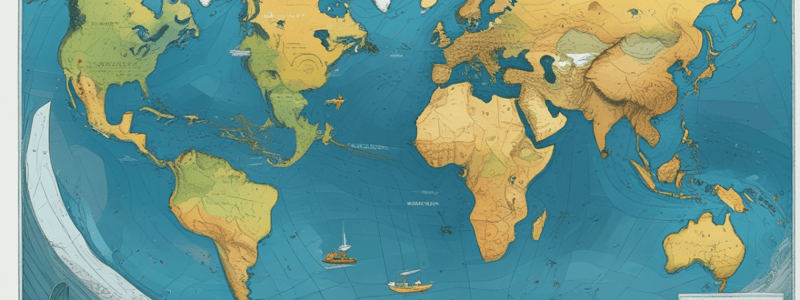Podcast
Questions and Answers
What is the primary force behind the changing levels of the oceans?
What is the primary force behind the changing levels of the oceans?
- Wind
- Earth's rotation
- Tidal force (correct)
- Ocean currents
What is the effect of the moon's gravitational pull on the oceans?
What is the effect of the moon's gravitational pull on the oceans?
- It causes the oceans to rotate faster
- It repels the ocean, causing the tides to fall
- It creates waves on the surface of the ocean
- It attracts the ocean, causing the tides to rise (correct)
Why don't we feel the moon's gravitational pull on our bodies?
Why don't we feel the moon's gravitational pull on our bodies?
- Because the moon is too far away
- Because the moon is too small
- Because the Earth's gravity is stronger (correct)
- Because the moon's gravity is only strong on the oceans
What would happen if the moon were to attract our bodies with a stronger force?
What would happen if the moon were to attract our bodies with a stronger force?
What is the result of the tidal forces on the Earth's surface?
What is the result of the tidal forces on the Earth's surface?
Why are the oceans more affected by the moon's gravitational pull than our bodies?
Why are the oceans more affected by the moon's gravitational pull than our bodies?
What is the name of the force that causes mountains to rise and fall?
What is the name of the force that causes mountains to rise and fall?
What is the primary reason why the moon's gravity pulls more strongly on the oceans on the near side of the Earth?
What is the primary reason why the moon's gravity pulls more strongly on the oceans on the near side of the Earth?
What is the shape of the solid parts of the Earth due to the moon's gravitational pull?
What is the shape of the solid parts of the Earth due to the moon's gravitational pull?
Why are the tidal bulges caused by the sun less than half as high as those caused by the moon?
Why are the tidal bulges caused by the sun less than half as high as those caused by the moon?
What occurs when the moon, sun, and Earth align at full moon and new moon?
What occurs when the moon, sun, and Earth align at full moon and new moon?
What is the term for the unusually weak ocean tides that occur at first- or third-quarter moon?
What is the term for the unusually weak ocean tides that occur at first- or third-quarter moon?
Why do the tidal bulges occur slightly ahead of their expected position?
Why do the tidal bulges occur slightly ahead of their expected position?
What is the height of the tidal bulges in deeper parts of the ocean, away from land?
What is the height of the tidal bulges in deeper parts of the ocean, away from land?
What is the maximum tidal distortion of the solid parts of the Earth?
What is the maximum tidal distortion of the solid parts of the Earth?
Flashcards are hidden until you start studying
Study Notes
Tidal Forces and Tides
- Tidal forces are the difference in the strength of gravity between two points on a body, causing deformations called tides.
- Tides are not limited to ocean levels, but can also cause mountains to rise and fall, distort galaxies, and affect objects near a black hole.
The Moon's Effects on Tides
- Gravity is a mutual force, with both the Earth and moon attracting each other.
- The moon's gravity attracts the oceans, causing them to bulge on the near side of the Earth.
- The moon's gravity also pulls the Earth away from the oceans, causing another bulge on the far side.
- These bulges are known as tidal bulges, resulting in tides rising and falling twice in 24 hours.
- The moon's gravitational pull has a greater effect on the oceans than the solid parts of the Earth.
Tidal Bulges
- Tidal bulges are about 3 feet in height in deeper parts of the ocean, and up to 40 feet in areas like the Bay of Fundy.
- The maximum tidal distortion of the solid parts of the Earth is only about 20 cm.
The Sun's Effects on Tides
- The sun also causes tides, but its effect is less than half that of the moon due to its greater distance from the Earth.
- The sun's tidal acceleration is approximately half that of the lunar tidal acceleration.
- The combined effect of the sun and moon results in spring tides, with very high and low tides, at full and new moon.
- When the sun and moon are at right angles, their tidal forces partially cancel each other out, resulting in neap tides.
Studying That Suits You
Use AI to generate personalized quizzes and flashcards to suit your learning preferences.



